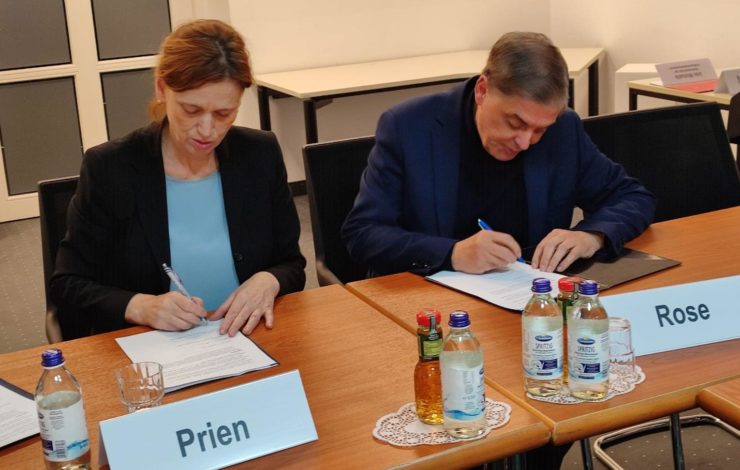 Minister Karin Prien, President of the Standing Conference of the Ministers of Education and Cultural Affairs of the Länder in the Federal Republic of Germany, and Romani Rose, Chairman of the Central Council of German Sinti and Roma, are to sign the joint declaration on 12 December 2022 in Berlin (Photo: Central Council).
Minister Karin Prien, President of the Standing Conference of the Ministers of Education and Cultural Affairs of the Länder in the Federal Republic of Germany, and Romani Rose, Chairman of the Central Council of German Sinti and Roma, are to sign the joint declaration on 12 December 2022 in Berlin (Photo: Central Council).
The Standing Conference of the Ministers of Education and Cultural Affairs of the Länder in the Federal Republic of Germany, together with the Central Council of German Sinti and Roma, and the Alliance for Solidarity with the Sinti and Roma of Europe, has adopted a joint declaration on the impartation of the history and present of Sinti and Roma in schools. With this declaration, the three participants would like to work towards schools intensifying their engagement with the history and present of the Sinti and Roma in the classroom and in extracurricular activities. In particular, the goal is to raise aware of antigypsyism in the classroom and also during teacher training. Historical and political subjects as well as religion and ethics classes offer opportunities to incorporate the topic, as do language, literary, and arts classes. This should be taken into account when expanding the curricular as well as in the development of handouts. Some elements of the topic can also be incorporated into the primary school, as it is the place where children gain their first experiences in learning to deal with themselves and others.
Karin Prien, President of the Conference of Ministers of Education and Cultural Affairs 2022 and Minister for Education, Training, Science, Research and Culture of the State of Schleswig-Holstein stated: “Knowledge about Sinti and Roma should be taught in the context of German and European history and culture. It must become clear that Sinti and Roma, like other minorities, are an integral part of the history and present of the countries and societies in which they live. The history of the Sinti and Roma is not exclusively one of exclusion and persecution. Therefore, it is important to address their cultural contributions, for example in music, visual and performing arts, literature and film. This gives students the opportunity for empathetic experience and appreciation.”
Romani Rose, Chairman of the Central Council of German Sinti and Roma, further said: “There is far too little awareness of the fact that Sinti and Roma have been an integral part of German society for centuries. That they also made significant contributions to European cultural history. Presenting an authentic image of the Sinti and Roma and contrasting it with the stigmatization of the minority as “foreigners” is an urgent imperative for all educational institutions in Germany. School is an important place that can open up horizons for children and young people beyond their everyday experiences, and is capable of debunking and deconstructing prejudices and distorted images. I have great hope that on the basis of our joint declaration and the associated voluntary commitment of the Länder, we will come closer to the goal of grounding school education on human rights.”
Uwe Neumärker, spokesperson for the Alliance for Solidarity with the Sinti and Roma of Europe – an alliance of civil society and self-organizations of minorities – welcomed the signed educational recommendations: “The Alliance considers the declaration a great success of its work and above all a first major milestone. The Alliance hopes that these recommendations will be implemented as soon as possible on a mandatory basis in the curricula and teaching practices of the Federal Republic of Germany. These recommendations encourage the understanding that their application be regularly reviewed by the KMK, in the interests of sustainability.”



